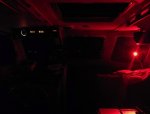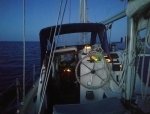Elessar
Well-known member
Not a bad list Henry except the “consider delaying”. Night boating is a great pleasure.I see nothing entertaining about a serious accident that left people in hospital and which saw emergency services airlifting casualties.
You must live in a very different world to me.
We might all make assumptions as to the cause but until the skipper comes on here or the accident report gets published I would suggest keeping those assumptions to ourselves.
By all means consider best practice for night time journeys. My advice would be:
Zero alcohol
Consider whether you actually need to make the trip or whether it can wait until daylight
Make extra allowance for weather and tides
Have everyone wearing a life jacket and brief everyone on the boat, your plans and the additional risks at night
Sort out lighting so you are not “ blinded”
Ensure nav lights are on and working
Set chart plotter and instruments to night mode / dim them right down
Consider plotting a course even if you are familiar with the area
Use radar if fitted
Proceed with caution at slow speed
Consider using auto pilot to hold you on a steady course. This will stop you from inadvertently veering off course and reduce workload
Consider allocating navigation duties to someone else IF you have a suitably qualified person on board allowing you to concentrate on helming the boat.
Continue to manage guests / passengers on board who may not be aware of the potential dangers.
Keep referencing lights and marks with your chart plotter / radar and position. Predict what you should be seeing and compare that to what you are seeing with your eyes.
It’s not an extensive list but it gives you some things to consider.
Don’t use the pressure of guests on board to attempt your first night time trip. That should be done with the company of a qualified instructor / experienced skipper.
Henry
I’d say to give the helming to someone else before the navigation.
Also I disagree with you about referencing plotter often. I turn charts screens off and navigate properly. Better for night vision. Even if your plotter has a night mode. I seem to be in a minority (maybe of 1!) on this point.
I’d add don’t forget about the moon. I went to Chichester marina in the dark single handed a few months ago. It was a new moon and it caught me out - going through the moorings at the top of the harbour was a challenge as it was very dark indeed and I struggled a bit. On the “don’t go faster you can see” principle I was at about 1/4 knot!
The “don’t go faster than you can see” principle is the most important of the lot. We don’t have to speculate that was sadly not the case in Totland bay.


